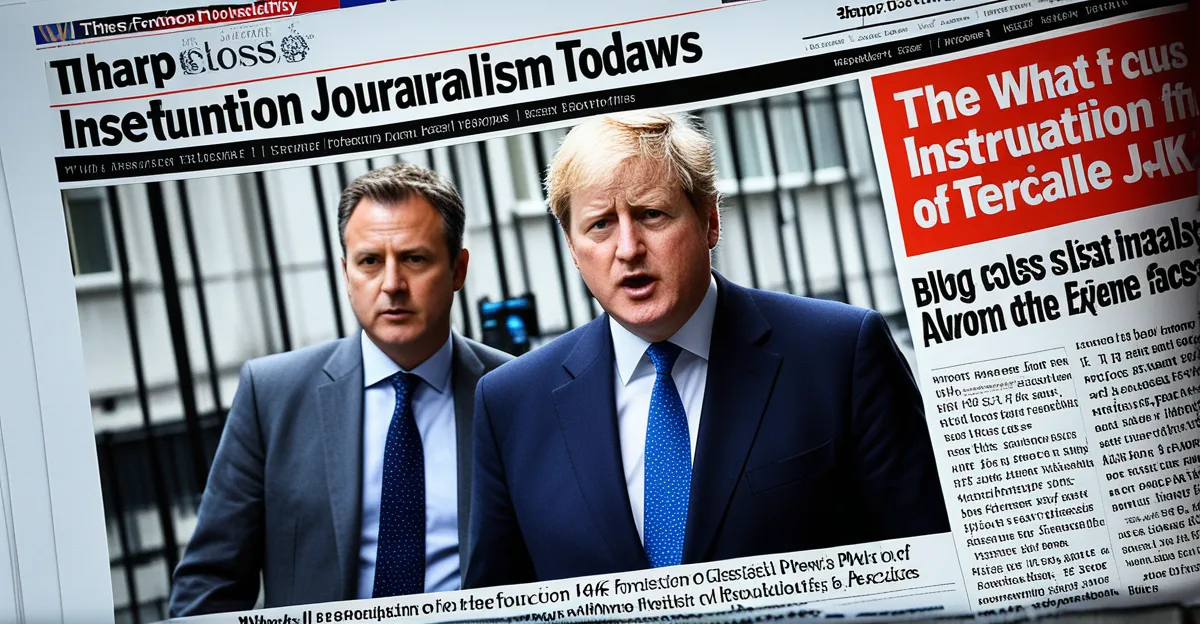Defining Investigative Journalism in the UK
Investigative journalism in the UK is characterised by its dedication to uncovering hidden truths through persistent, in-depth research. Unlike standard news reporting, which often focuses on immediate events or surface-level facts, investigative journalism digs beneath the surface to reveal wrongdoing, corruption, or systemic failures. This form of journalism prioritises detail-oriented analysis, extensive fact-checking, and often involves accessing confidential or difficult-to-obtain information.
The core principles distinguishing investigative journalism include its commitment to public interest, independence from influence, and rigorous verification of information. It routinely involves longer timeframes to complete meaningful investigations, unlike routine reporting that covers daily news quickly.
Also to see : Why Are UK Universities Adapting Their Curricula for the Changing Job Market?
Within the UK news landscape, investigative journalism plays a crucial role by exposing issues that can influence public policy and societal change. The UK’s robust legal framework and vibrant media ecosystem provide a unique environment where investigative reporting can thrive, addressing matters from political scandals to corporate malpractice, highlighting its importance in safeguarding democratic values. This emphasis on rigorous investigation and accountability is what sets it apart from other journalism types, maintaining its essential role in the UK’s media.
Recent Impact and High-Profile Cases
Recent UK investigative journalism impact has been profound, with several notable stories shaping public discourse. For instance, investigations exposing systemic failures in public institutions have garnered widespread attention, highlighting the crucial role of in-depth reporting in UK news. These high-profile cases demonstrate how thorough analysis and persistent inquiry reveal concealed issues far beyond surface-level reporting.
Also to see : How is the UK’s Energy Crisis Affecting Everyday Citizens?
Leading UK investigative journalists and teams have consistently pushed boundaries to uncover truths. Their work exemplifies the power of investigative journalism to inform and influence. Prominent examples include exposés on political misconduct and corporate malpractice, which have led to significant legal scrutiny and reforms.
A key question often asked is: How has investigative reporting influenced public policy or opinion? The answer lies in its ability to hold authority accountable by presenting verified facts and comprehensive evidence. This, in turn, pressures policymakers to respond, ensuring transparency and upholding democratic ideals. The impact of UK investigative journalism extends across social, legal, and political arenas, reinforcing its essential role in society today.
Challenges Facing Investigative Journalists in the UK
Investigative journalism in the UK faces significant challenges that affect its effectiveness and independence. Among these, legal risks stand out as a major concern. Journalists often navigate complex libel laws and privacy regulations, which can restrict the scope of their investigations or lead to costly legal battles. This legal landscape demands careful adherence to truth and verification, underscoring the essential need for thorough fact-checking.
Financial hurdles also impede many investigative projects. The extensive time and resources required for in-depth reporting contrast with shrinking newsroom budgets and economic pressures on media outlets. This scarcity of resources limits the frequency and depth of investigations, potentially curbing the reach of impactful UK investigative journalism.
Press freedom, though robust compared to many countries, faces pressures through regulatory oversight and political scrutiny. Investigative journalists contend with both overt and subtle constraints that can discourage bold reporting. Moreover, newsroom support, including editorial backing and technical assistance, is not always guaranteed, adding to the challenges journalists in the UK routinely manage to uphold their commitment to uncovering hidden truths.
Benefits of Investigative Journalism in UK Society
Investigative journalism in the UK plays a vital role in promoting accountability and transparency. By exposing corruption, malpractice, and systemic issues, it holds those in power to account who might otherwise act unchecked. This benefit extends beyond mere exposure—it fosters a culture where institutions are scrutinised rigorously, encouraging ethical behaviour across public and private sectors.
Another critical contribution is its enhancement of public knowledge. Investigations often reveal complex truths that standard reporting cannot cover, enabling citizens to make informed decisions and participate meaningfully in democratic processes. For example, detailed investigations into political funding or public health failures enrich societal understanding and stimulate public debate.
Furthermore, numerous high-profile investigations have prompted legal or institutional change in the UK. Such investigations lead to policy reforms or regulatory adjustments, demonstrating how investigative journalism translates research into real-world impact. This dynamic underscores its indispensable role in strengthening UK society through vigilant, persistent inquiry.
Ongoing Relevance and Influence in the UK News Landscape
Investigative journalism remains highly relevant and influential within the UK news today. Its adaptability to evolving platforms—such as digital media and data journalism—allows it to reach wider audiences, maintaining the public’s demand for thorough, fact-based reporting. This evolution is essential as traditional print faces decline, making investigative journalism’s presence on online platforms crucial.
The influence of investigative journalism in the UK is strengthened by audience trust. Research indicates that readers value detailed investigations that uncover facts rather than mere opinion or sensationalism. This trust motivates newsrooms to continue investing in investigative work despite financial challenges.
Looking ahead, the future role of investigative journalism in the UK is likely to expand through technological innovation and collaborative efforts. New tools for data analysis and crowd-sourcing information will support deeper investigations. The field’s sustained relevance depends on its ability to combine rigorous reporting with these innovations, ensuring it continues to hold power accountable and inform the public with precision. This ongoing influence cements investigative journalism as indispensable within the UK news ecosystem.





